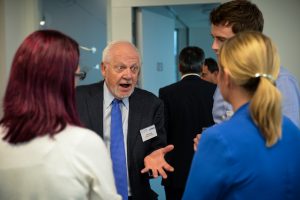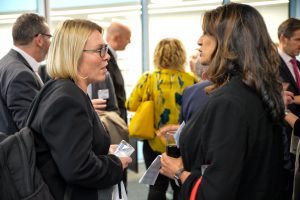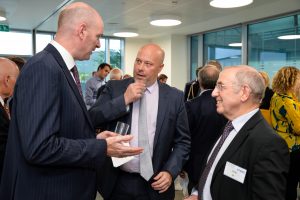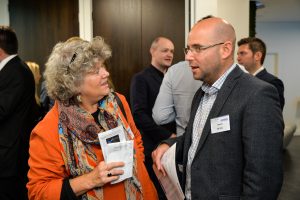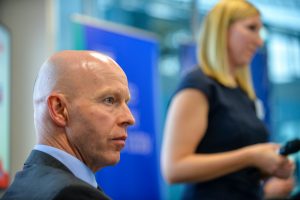Leaders urge every business to put energy into unlocking full potential of Northern economy

“If businesses all work in partnership across the region, then the North will be in pole position to be the driving force behind new technologies that will power the UK for years to come and to power our economy too,” the chief executive of Drax Power declared as he spoke at a seminar highlighting the importance of the North’s economy.
Andy Koss told TheBusinessDesk.com’s Power of the North seminar: “Every business in the region has a part to play, and the more we can collaborate and innovate, the better. The role of the Northern Powerhouse isn’t just about the benefits it can bring to the region, as if it is successful than the impact will be felt right across the country and even the world.”
At the event, which was attended by around 100 senior business representatives and hosted by Kayley Worsley, Yorkshire editor at TheBusinessDesk.com, keynote speakers – Councillor Judith Blake, Leeds City Council leader, Drax Power chief executive Andy Koss and Office Managing Partner at Squire Patton Boggs, John Alderton – all agreed that it is now time to collectively shout about the booming Northern economy.
It was the final event as part of the State of the Region project, a collaboration between TheBusinessDesk.com, Squire Patton Boggs and KPMG, which this month focuses on energy. The speakers addressed the strengths of the North and how the the right access to investment, innovation, skills and leadership can help work towards re-balancing the UK’s economy.

Councillor Judith Blake
Councillor Blake noted how important the “whole sense of identity” is for the North. She said: “When I go to London you can actually feel that it is now cool to be from the North.”
She also highlighted that in terms of the economy, if the North was a separate country it would be the world’s 21st largest economy. The North generates £390bn in GVA per annum which represents a fifth of the total economy of Great Britain, she said. This includes 6.5m jobs, 5m of which are in the private sector.
Councillor Blake said that to realise the full economic potential of the Northern regions, collaboration between all cities across the north was crucial.
She said: “So through the Northern Powerhouse concept, the large cities across the North are really starting to look at how they can work together. Not to compete with each other, but to actually look at how they can collaborate to recognise the strengths the North has and showcase some of the incredible opportunities there are, as well as the challenges.”
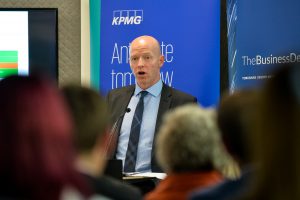
John Alderton
Squire Patton Boggs is one business that has experienced the benefits of working closely with other organisations. John Alderton, Office Managing Partner in Leeds, explained: “We were delighted to be chosen to work on some of the region’s largest infrastructure projects, which will ensure that the North is fit-for-purpose for future generations.
“The projects themselves demonstrate that business and public sector do seem to be much more aligned and they also show that they are more aligned than ever in regards to the industrial strategy, ensuring the Northern Powerhouse really can make a mark.”
When discussing the regional economy post-Brexit, Councillor Blake addressed importance of focusing, not just on the region’s major cities, but also the towns.
She said: “Many of us are really beginning to see that post-Brexit, each regional economy is really going to come into their own. We need to be proactive in strengthening our key industrial clusters and also drive to get the recognition of the infrastructure we need whether its transport, housing, IT and broadband.
“Post-brexit, we are very conscious that this isn’t just about cities, but it is also about the towns that make up the regions. So ‘how can we look at the wider city regions across the north and analyse what skills are needed and where can we find them?’
“We really need to understand the concept of place. So it is much more important now that a business working in a particular location has access to certain reference points in the area, such as the education community and health community.”
In terms of skills and educations, Koss spoke on investing in the region’s younger generation.

Andy Koss
Koss also told the seminar: “To maximise the North’s potential we need people with the creativity, dedication and skills required. Not just now, but for years to come. One of my favourite moments recently was meeting our new apprentices. These are the next generation of innovators and who will continue to put the North at the heart of the UK’s economic growth.
“If we don’t invest in our children’s future then the future economy will suffer. We have world-class engineers now, but we need to do more to ensure that the next generation has the right education and skills, particularly in STEM (science, technology, engineering and maths) to carry on that legacy.”
Koss went on to talk about how it is especially “vital” to invest in the next crop of engineers due to the emerging energy sector in Yorkshire, which is anchored by Drax’s ongoing decarbonisation project. This was recently boosted by the news that Drax is set to acquire Scottish Power’s portfolio of pumped storage, hydro and gas-fired generation for £702m from Iberdrola – Scottish Power’s parent company.
Koss explained: “The impact of climate change has made it clear that we need to decarbonise and do that, we must progress without coal. The drive to decarbonise the power systems led to huge growth in renewables including biomass and wind power, which are technologies now synonymous with this region. It has also led to the development of significant supply chains, creating jobs and growth.
“The energy industry as a whole is playing a vital role in the region’s economy. At Drax, we alone contribute more than £500m a year to the Northern economy and we support 6,000 jobs across the region.
“Getting off coal has not been easy. At Drax when we knew the writing on the wall was for coal, we decided to use wood pellets, known as biomass.
“But due to our high-skilled engineers were able to transform the UK’s largest coal-fired power station into the largest decarbonisation project in Europe. We invested hundreds of millions of pounds investing in new biomass handling and storage facilities and an entirely new global supply chain has been created to ensure we could source the biomass that we needed. This included new port facilities at Liverpool, Newcastle, Immingham and Hull. Two thirds of the power station now generates renewable power, producing enough electricity to power four million homes.”

She said: “We are a young and growing city, and together with Bradford we are probably the youngest demographic in the country. The other crucial thing is that I think we are getting a reputation for delivery. If you look at our investment programme of £10bn has delivered such projects of Trinity Leeds, Victoria Gate and First Direct Arena. We are also anticipating that the city centre will double in size with the regeneration possibilities going on.
“We also want to grow the fact that the city is producing the highest number of private sector job growth in the country, and one of the highest growths of business startups and scale-ups in the UK.”
Councillor Blake concluded by telling the attendees: “I don’t think we’ve ever had the spirit of collaboration that we now are experiencing across the North. It might be difficult to put your finger on exactly what the Northern Powerhouse is but I can tell you that in terms of transforming relationships it is very real indeed.”
John Alderton, Office Managing Partner at Squire Patton Boggs, echoed these remarks. When discussing the findings from the State of the Region project, Alderton said: “The project set out to examine how individual business sectors drive the Northern economy, to attract investment and bolster the prestige of the region and its prosperity. I think this has been achieved.
“The project has shown that traditional and heritage sectors such as retail and manufacturing can live side by side with emerging and evolving sectors such as fintech, the alternative energy markets and the renewables sectors. All of those businesses have the ability to grow and evolve in the North despite the economic uncertainty, political upheaval and the dynamic markets we all work in.”



